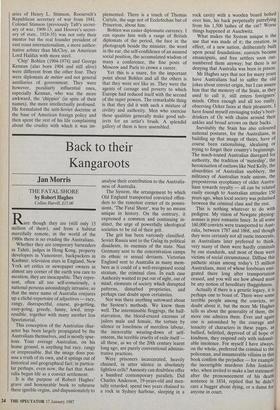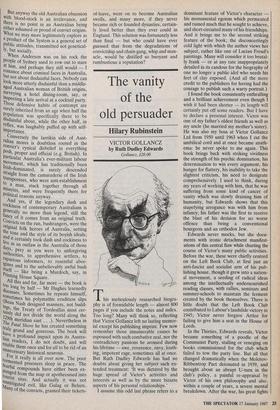Back to their Kangaroots
Jan Morris
THE FATAL SHORE by Robert Hughes
Collins Harvill, f15.00
Rare though they are (still only 15 million of them), and from a habitat mercifully remote, in the world of the 1980s there is no evading the Australians.
Whether they are temporary bartenders in Tahiti, judges in Hong Kong, property developers in Vancouver, backpackers in Kashmir, television stars in England, New York art critics or newspaper owners in almost any corner of the earth you care to mention, they are inescapable. They repre- sent, often all too self-consciously, a national persona astonishingly intrusive, so that the mere name of Australia conjures up a cliché-repertoire of adjectives — racy, rangy, disrespectful, coarse, go-getting, easy-going, greedy, funny, lewd, irrep- ressible, together with many another less Spectatorial.
This conception of the Australian char- acter has been largely propagated by the Australians themselves, and is mostly spur- ious. Your average Australian, on his home ground, is anything but racy, rangy or irrepressible. But the image does pos- sess a truth of its own, and it springs out of historical and geographical fact; in particu- lar perhaps, even now, the fact that Aust- ralia began life as a convict settlement.
It is the purpose of Robert Hughes' grave and honourable book to rehearse these ignoble orgins, and dispassionately to analyse their contribution to the Australia- ness of Australia.
The System, the arrangement by which Old England transported convicted offen- ders to the remotest corner of its posses- sions, 'The Fatal Shore', was by no means unique in history. On the contrary, it expressed a common and continuing in- stinct, the urge of powerfully ideological societies to be rid of their grit.
The grit has been variously classified. Soviet Russia sent to the Gulag its political dissidents, its enemies of the state. Nazi Germany sent to the concentration camps its ethnic or sexual deviants. Victorian England sent to Australia as many mem- bers as it could of a well-recognised social stratum, the criminal class. In each case Authority wanted to put out of sight, out of mind, elements of society which disrupted patterns, disturbed proprieties, and perhaps cast doubt upon certainties.
Nor was there anything untoward about the System's methods. We know them well. The interminable floggings, the half- starvation, the blood-crazed excesses of jailers male and female, the torture by silence or loneliness of merciless labour, the inexorable wearing-down of self- esteem, the terrible cruelty of exile itself all these, as we of the 20th century learnt long ago, are purely conventional adminis- trative practices.
Were prisoners incarcerated, heavily chained, in utter silence in absolutely lightless cells? Amnesty can doubtless offer a hundred contemporary parallels. Did Charles Anderson, 19-years-old and men- tally retarded, spend two years chained to a rock in Sydney harbour, sleeping in a rock cavity with a wooden board bolted over him, his back perpetually putrefying from his 1,500 lashes of the cat? Worse things happened at Auschwitz. What makes the System unique, is the use that was made of it; the creation, in effect, of a new nation, deliberately built upon penal foundations; convicts became emancipists, and free settlers soon out- numbered them anyway; but there is no denying that Australia was born in prison.
Mr Hughes says that not for many years have Australians had to suffer the old jokes about convict origin, but I can assure him that the memory of the Stain, as they used to call it, still enters foreigners minds. Often enough and all too easily, observing Ocker faces at their pleasures, I have found myself envisaging today's beer- drinkers of Oz with chains around their ankles and broad arrows on their backs.
Inevitably the Stain has also coloured national postures, for the Australians, in building up that image of theirs, have of course been rationalising, idealising or trying to forget their country's beginnings. The much-touted Australian disregard for authority, the tradition of `mateship', the heroicisation of outlaws like Ned Kelly, the absurdities of Australian snobbery, the militancy of Australian trade unions, the preposterous sycophancy of older Austra- lians towards royalty — all can be related easily enough to Australian attitudes 150 years ago, when local society was polarised between the criminal class and the rest.
This is nothing whatever to do with pedigree. My vision of Newgate physiog- nomies is pure romantic fancy. In all some 160,000 convicts were transported to Aust- ralia, between 1787 and 1868, and though they were certainly not all rustic innocents, as Australians later preferred to think, very many of them were hardly criminals by our standards, and most of them were victims of social circumstance. Diffuse this pathetic strain among today's 15 million Australians, most of whose forebears emi- grated there long after transportation ceased, and you will see how absurd must be any notion of hereditary thuggishness. Actually if there is a genetic legacy, it is perhaps one to boast of. There were some terrible people among the convicts, no doubt about it, but the more Mr Hughes tells us about the generality of them, the more one admires them. Ever and again one is astonished by the courage and tenacity of characters in these pages, as bullied, belittled, deprived of all hope or kindness, they respond only with indomit- able insolence. For myself I have always, on the whole, preferred the criminal to the policeman, and innumerable villains in this book confirm the prejudice — for example the incorrigible murderer John Jenkins, who, when invited to make a last statement after the pronouncement of his death sentence in 1834, replied that he didn't care a bugger about dying, or a damn for anyone in court. But anyway the old Australian obsession with blood-stock is an irrelevance, and there is no point in an Australian being either ashamed or proud of convict origins. What we may more legitimately explore as a product of the System is a general set of Public attitudes, transmitted not genetical- ly, but socially. When Anderson was on his rock the people of Sydney used to row out to stare at him, and perhaps they still would — I romance about criminal faces in Australia, but not about disdainful faces. Nobody can look more utterly disdainful than a middle- aged Australian woman of British origins, surveying a hotel dining-room, say, or inspecting a late arrival at a cocktail party. These defensive habits of contempt are surely inherited from an age when half the Population was specifically there to be disdainful about, while the other half, in reflex, was laughably puffed up with self- importance.
Conversely the larrikin side of Aust- ralian mores is doubtless rooted in the convict's cynical disbelief in everything MI, proper and official (e.g. British). In Particular Australia's ever-militant labour movement, which has traditionally been Irish-dominated, is surely descended straight from the camaraderie of the Irish transPortees, who were anti-establishment to a man, stuck together through all miseries, and were frequently there for Political reasons anyway. And yes, if the legendary dash and cockiness of contemporary Australians is generally no more than legend, still the fancy of it comes from an original truth. Convicts on the run, bushrangers, were the Original folk heroes of Australia, setting the tone and the style of its boyish ideals; and d it certainly took dash and cockiness to live as an outlaw in the Australia of those daYs, prey as you were to unforgiving authorities, to apprehensive settlers, to rapacious informers, to resentful abor- igines and to the unbelievably awful bush itself — like being a Murdoch, say, in Printing House Square. All this and far, far more — the book is too long by half — Mr Hughes learnedly discusses. Sometimes he repeats himself, sometimes his polymathic erudition slips (Beau Nash designed manners, not build- ings, the Treaty of Tordesillas most cer- Lamly did not divide the world along the 129th meridian east . . .). Nevertheless in The Fatal Shore he has created something tjulY grand and generous. The book will ,,Have a profound impact upon its Austra- lian readers, I do not doubt, and will enable them once and for all to be rid of an unnecessary historical neurosis. . For it really is all over now. The poor tormented prisoners sleep in peace. The 'earful compounds have either been ex- ?tinged from the map or apotheosised into tourist sites. And actually it was not unmitigated evil, like Gulag or Belsen. wlany of the convicts, granted their tickets- of-leave, went on to become Australian swells, and many more, if they never became rich or founded dynasties, certain- ly lived better than they ever could in England. This solution was fortunately less than final — but who could have ever guessed that from the degradations of convictship and chain-gang, whip and man- acle, would be distilled so buoyant and rumbustious a reputation?











































 Previous page
Previous page